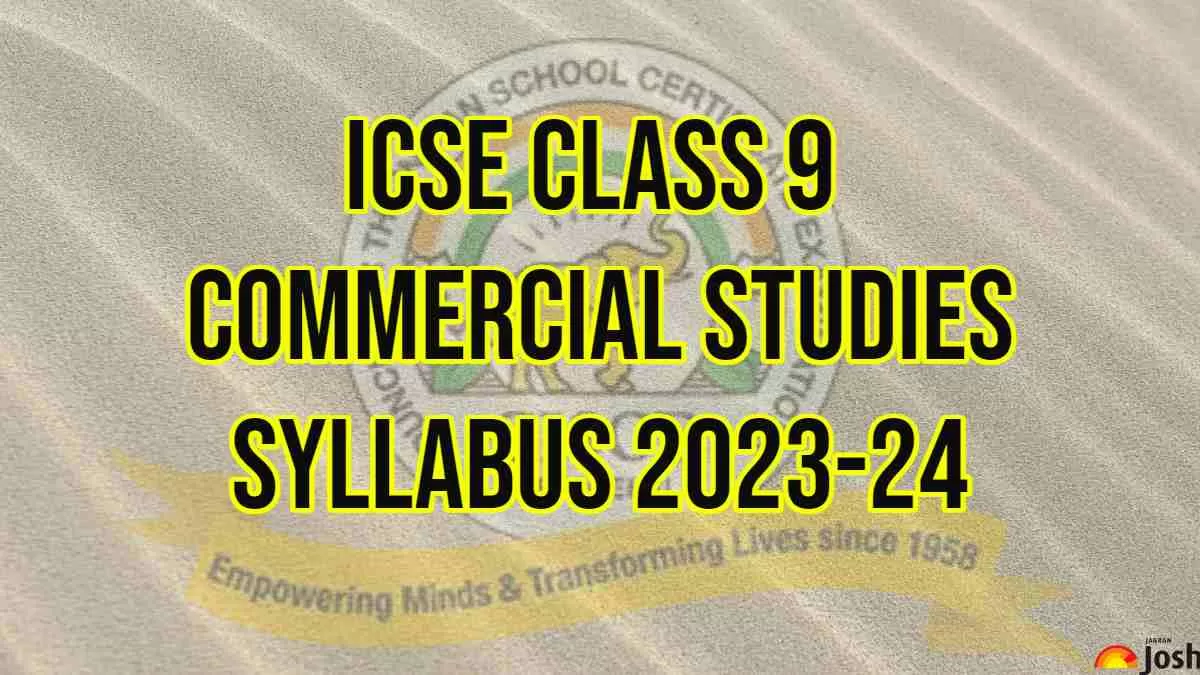Class 9 2023-24 Commercial Studies syllabus ICSE: The new academic session 2023-24 started in April 2023. Teachers and school administration are all set to take this new academic year forward with higher and better hopes. This same is expected from the students. Well, being a student your first task should be to collect the syllabus of all your subjects and go through them. This will help you prepare mentally for the new topics you will be studying in future. Many ICSE Class 9 students must have taken Commercial Studies as one of their electives. The subject is unique and thus requires a bit of extra effort. Well don’t worry, you will get all the essential information related to the subject here at Jagran Josh. Let us start with the updated 2023-24 syllabus of Commercial Studies for ICSE Class 9. The pdf for the same is attached in this same post, you can download it as well for better reference.
ICSE Commercial Studies Syllabus Aims:
1. To enable students to develop a perceptive, sensitive and critical response to the role of business in a global, national and local context.
2. To allow students to balance the demands of social parameters with individual aspirations.
3. To develop in students an appreciation for the roles of the entrepreneur and the professional manager.
4. To help develop a co-operative attitude through study of the organisation and participation associated with commerce and industry.
5. To provide an appropriate body of knowledge and understanding, and to develop appropriate skills as a basis for further study or work or both.
ICSE Class 9 Commercial Studies Syllabus General Guidelines:
1. There will be one written paper of two hours duration carrying 80 marks and Internal Assessment of 20 marks.
2. The paper will be divided into two sections A and B.
3. Section A (Compulsory) will consist of questions requiring short answers and will cover the entire syllabus.
4. Section B will consist of questions, which will require detailed answers. There will be a choice and candidates will be required to answer four questions from this section.
ICSE Class 9 Commercial Studies Syllabus 2023-24
| 1. Commercial Activities |
| (a) Commercial and Non-Commercial Activities Meaning and difference with examples. (b) Types of Commercial activities. Business, profession and employment – meaning and features. (c) Business Activities Meaning and characteristics. Types of business activities: industry and commerce; classification of industry (primary, secondary and tertiary – meaning and examples of each). (d) Non-profit Organisations Meaning and types (Society, trust, and non-nprofit companies - Meaning and Examples only). (e) Commerce Meaning of Commerce and its Classification: (i) Trade (types of trade: wholesale and retail, domestic and foreign, e-commerce & e-trade - meaning and examples of each. (ii) Aids to trade: transport, banking, advertising, insurance, warehousing, packaging – meaning and examples of each. (f) Commercial organizations - Classification on the basis of ownership. (i) Private Sector enterprise - Sole proprietorship, Partnership, one-person company, Joint-stock company, Limited liability partnership, Co-operative society (Meaning and features only). (ii) Public sector enterprise – Departmental undertaking, public corporation, and government companies (Meaning and features only). (iii) Joint Sector Enterprises – Meaning, features only. |
| 2. Important departments of a Commercial Organization |
| (a) Production (b) Purchasing and Stores (c) Marketing and Sales (d) Finance and Accounting (e) Human Resources (f) General Administration, Legal and Compliance (g) Management Information System (MIS) Meaning and objectives of each of the above |
| 3. Communication in Commercial Organisations |
| Meaning and process; role of communication in a commercial organisation; different methods of communication: letter, e-mail, conference calling (audio & video), telephonic conversation, social media – meaning of each. |
| 4. Introduction to Accounting and Bookkeeping |
| (a) Meaning and objective Meaning of accounting and bookkeeping; the objective of accounting; the accounting cycle; the distinction between accounting and bookkeeping. (b) Basic accounting terminology Capital, liability, asset, revenue, expense, purchase, sales, stocks, debtors, creditors, drawings, debit and credit, discount (Meaning only). (c) Basic accounting principles and concepts. Business entity, money measurement, going concern, accounting period, dual aspect and accounting equation, matching principle, principle of full disclosure – meaning and examples. (d) Journal Meaning of Journal; and classification of accounts, rules of debit and credit. Recording of transactions in the journal. (Simple numerical based on the terminology mentioned in part (b) need to be covered. Compound journal entries including cash discount, bad debts and opening and closing entries need not be covered). (e) Ledger Meaning, posting and balancing of ledger accounts. (Ledger posting on the basis of simple journal entries). (f) Trial balance Meaning, objectives and preparation of trial balance with the given set of ledger account balances. (Re-drafting of trial balance need not be covered.) (g) Cash Book Meaning, types of cash books, preparation of single-column cash book |
| 5. Banking |
| Commercial Banks - Functions and Types of Accounts (Savings, Current, Recurring & Fixed Account – meaning and difference only). |
| 6. Trade |
| (a) Channels of distribution Physical - C & F Agents, Wholesalers, Distributors & Retailers (meaning only). (b) E-commerce & E-trade Merits and demerits of online trading. |
| 7. Social Responsibility of Commercial Organisations towards the Environment |
A brief understanding of the above. |
| INTERNAL ASSESSMENT |
| A minimum of three assignments are to be done during the year, as assigned by the teacher. |
Get the complete syllabus in pdf format from the link below:
